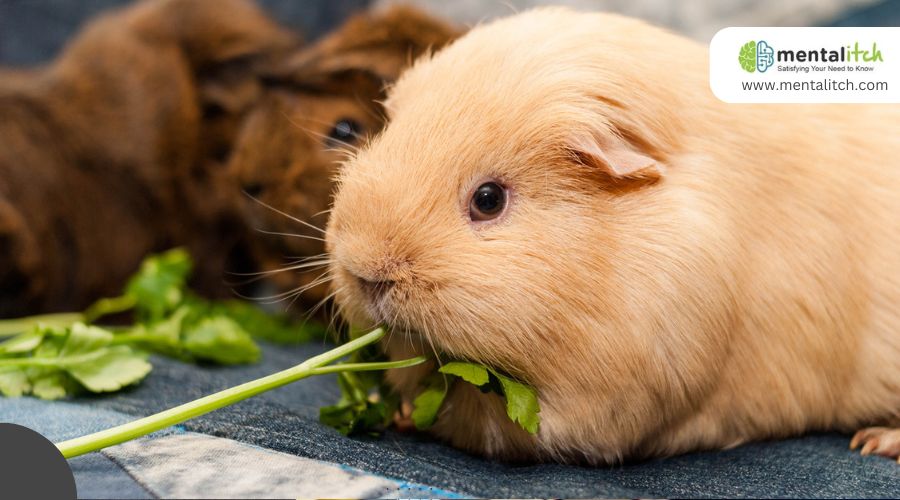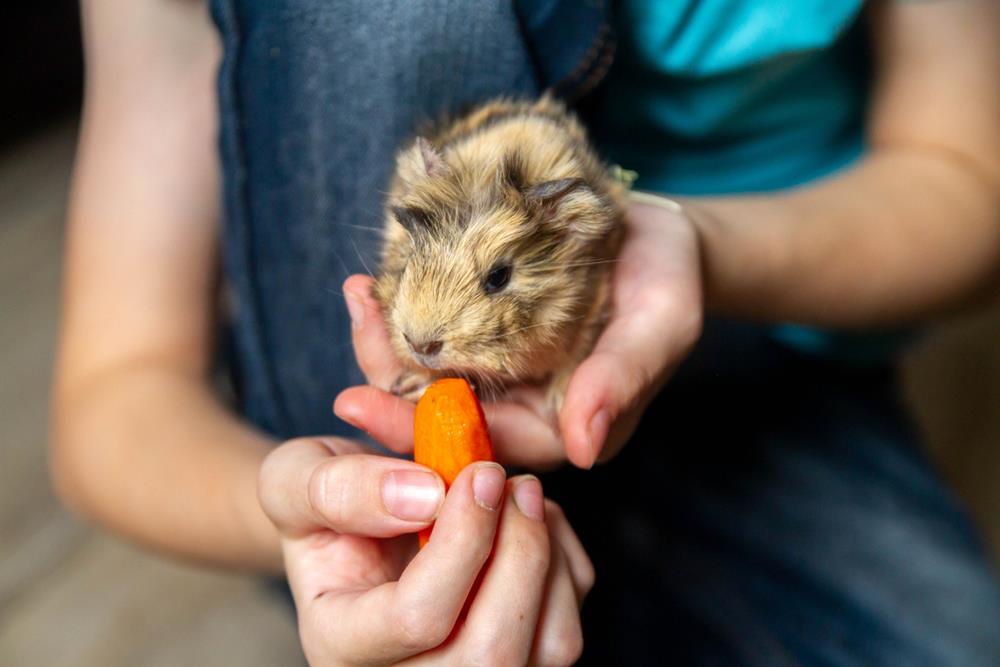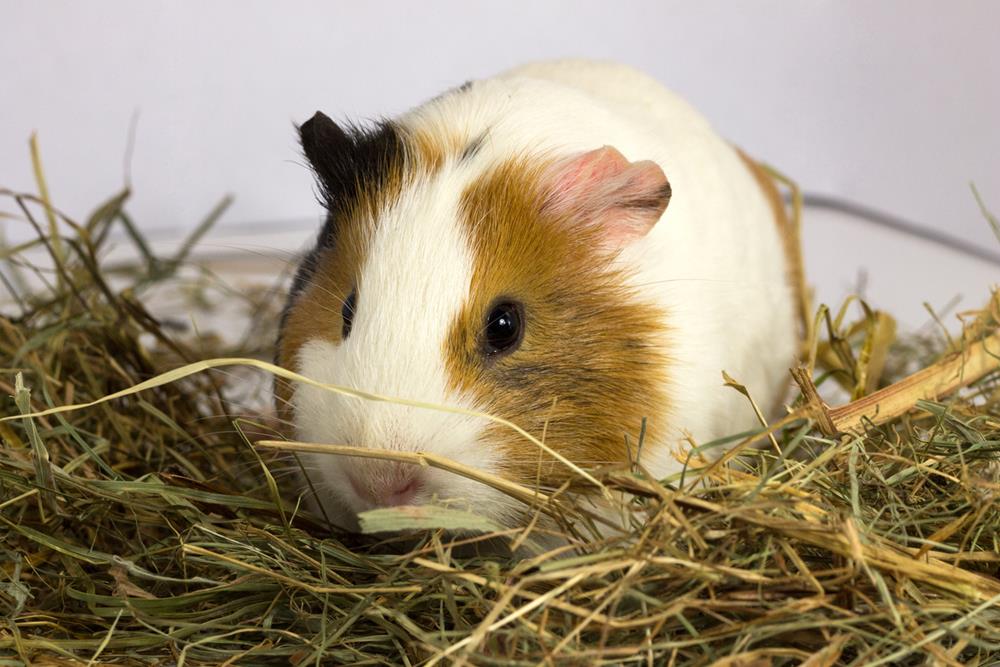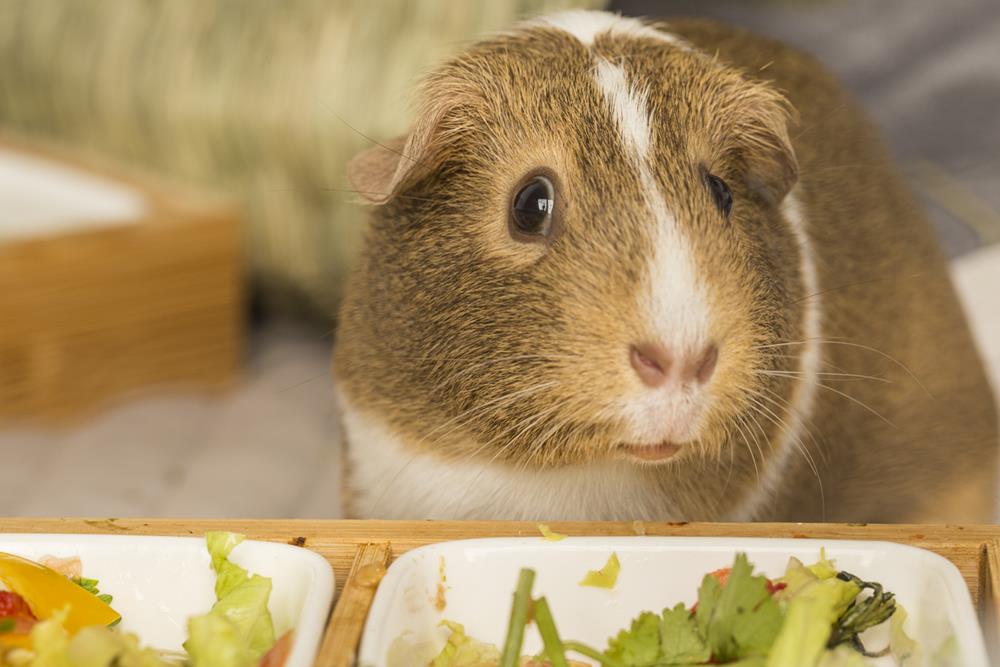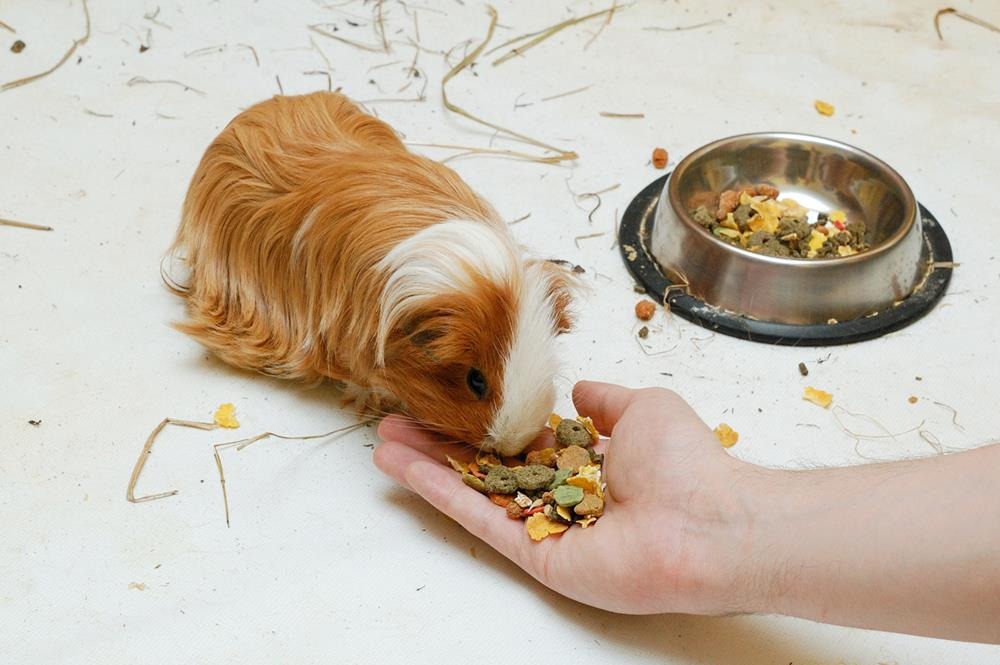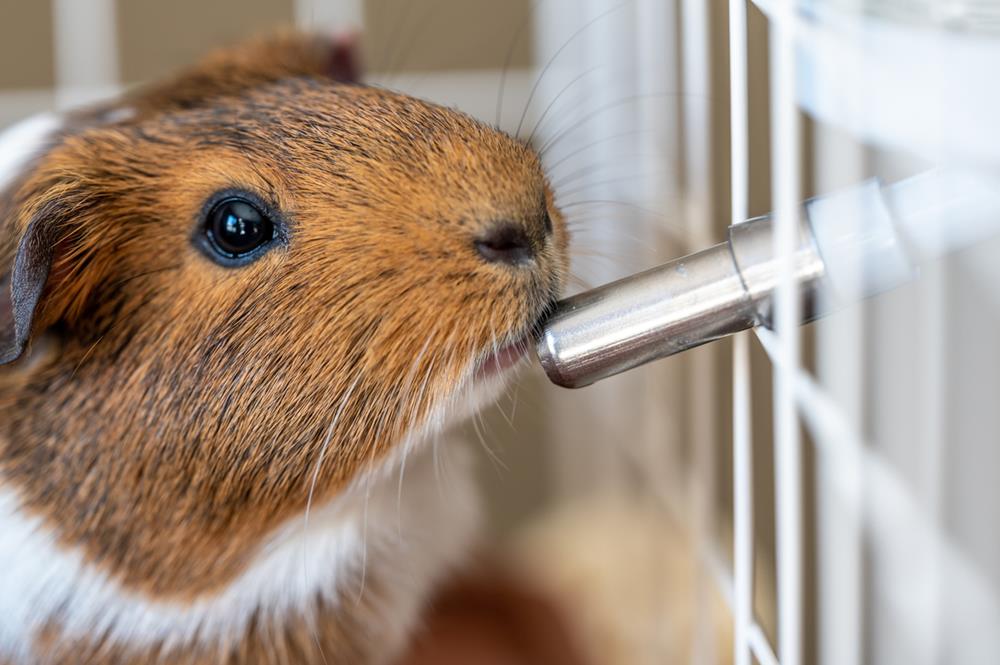Guinea pigs are adorable and fun pets, but to keep them happy and healthy, we need to make sure they eat the right foods. Just like us, they need a mix of different nutrients to stay healthy. In this guide, we’ll talk about what foods are good for your guinea pig and how to make sure they’re getting everything they need. We’ll cover the best veggies, the importance of hay, and how to treat them with fruits without overdoing it. Let’s dive into making a yummy and nutritious diet plan for your furry friend!
Understanding Guinea Pig Nutritional Needs
Essential Nutrients for a Happy, Healthy Guinea Pig
Guinea pigs, like any other living creature, require a balanced diet to live a long and healthy life. Their dietary needs are quite specific, and meeting these is crucial for their overall well-being. Here are the essential nutrients that must be included in their diet:
- Vitamin C: Unlike humans and other animals, guinea pigs cannot produce their own Vitamin C. They need a daily intake of their food to prevent scurvy, a disease that can cause lethargy, bleeding, and joint problems. Fresh leafy greens and certain fruits can be excellent sources.
- Fiber: A high-fiber diet is essential for maintaining a guinea pig’s digestive health. Fiber helps in the regular movement of their digestive system, preventing issues like GI stasis. Hay, which should make up the bulk of their diet, is an excellent source of fiber.
- Protein and Fats: While guinea pigs require these nutrients, the amount is much less compared to fiber. A balanced commercial guinea pig food usually provides the necessary amounts.
The Role of Hay
Hay is not just a filler; it’s the cornerstone of a guinea pig’s diet for several reasons:
- It provides the necessary fiber for digestive health.
- Chewing on hay helps them wear down their constantly growing teeth, preventing dental issues.
- Hay satisfies their need to forage and chew, keeping them occupied and happy.
Fresh Vegetables and Fruits: A Source of Vitamins
While hay should form the majority of their diet, fresh vegetables and fruits play a critical role in providing vitamins and minerals that hay alone cannot offer. However, not all vegetables and fruits are safe for guinea pigs, and some can only be given in moderation due to high sugar content or other potential health risks.
Understanding the nutritional needs of your guinea pig is the first step towards ensuring they lead a healthy and fulfilling life. By providing a diet rich in fiber, supplemented with fresh vegetables and fruits for additional vitamins and minerals, and being cautious about including Vitamin C-rich foods, you can create a dietary plan that supports their overall health and longevity.
What to Feed Your Guinea Pig
Ensuring your guinea pig has a balanced and nutritious diet is crucial for their health. Heres what you should be feeding your furry friends to keep them happy and healthy.
Best Types of Hay
Hay should be the staple of your guinea pig’s diet, making up about 80% of their daily food intake. It’s essential for their digestive health and dental care. The best types of hay for guinea pigs include:
- Timothy Hay: Rich in fiber and low in calcium, making it ideal for daily feeding.
- Orchard Grass Hay: A good alternative to Timothy hay, with a sweet smell that appeals to many guinea pigs.
- Meadow Hay: Offers variety in taste and texture, which can be stimulating for guinea pigs.
Recommended Vegetables and Fruits
Vegetables should be a daily part of your guinea pigs diet, while fruits are treats due to their high sugar content. Here are some safe options:
- Vegetables: Bell peppers, cucumber, carrots, and leafy greens like romaine lettuce and spinach are excellent choices. These provide essential vitamins and minerals, especially Vitamin C.
- Fruits: Fruits like apples, blueberries, and strawberries can be given in moderation as treats. They are high in sugar, so its important to only offer small amounts occasionally.
Safe and Nutritious Herbs
Herbs can be a wonderful addition to your guinea pig’s diet, offering extra nutrients and variety. Safe options include:
- Parsley: High in Vitamin C but should be given in moderation due to high calcium.
- Coriander (Cilantro): Loved by many guinea pigs and a good source of Vitamin C.
- Dill: This can help with digestion and add variety to their diet.
Water: The Essence of Life
Always ensure your guinea pig has access to fresh, clean water. Water bottles are preferred over bowls as they remain uncontaminated by bedding and food.
When introducing new foods to your guinea pigs diet, do so gradually to avoid digestive upset. Monitor their health and adjust their diet as needed based on their specific nutritional needs, age, and health status. A varied diet not only meets their nutritional requirements but also keeps mealtime interesting for your guinea pig.
Foods to Avoid
When planning your guinea pig’s diet, it’s just as important to know what foods to avoid as it is to know what foods to include. Some foods can be harmful to guinea pigs, causing digestive problems, toxicity, or other health issues. Here’s a list of foods to steer clear of:
Toxic and Harmful Foods
- Chocolate and Caffeine: These contain substances that are toxic to guinea pigs, potentially leading to serious health problems.
- Onions and Garlic: These vegetables can cause blood disorders and should never be fed to guinea pigs.
- Avocado: High in fat, avocado can lead to weight gain and other health issues in guinea pigs.
- Dairy Products: Guinea pigs are lactose intolerant and cannot digest any dairy products, leading to digestive distress.
Foods That Cause Gas or Bloating
- Cabbage, Cauliflower, and Broccoli: While not toxic, these vegetables can cause gas and discomfort in guinea pigs. If you choose to feed these, do so sparingly.
- Beans and Lentils: These can also cause gas and should be avoided.
High Sugar and High-Fat Foods
- Sweets and Baked Goods: High sugar content is unhealthy for guinea pigs and can lead to obesity and diabetes.
- Nuts and Seeds: High in fat, these can cause weight gain and other health issues.
Other Items to Avoid
- Iceberg Lettuce: Offers very little nutritional value and can cause diarrhea in large quantities.
- Unwashed Vegetables and Fruits: These can contain harmful pesticides and chemicals. Always wash produce thoroughly before feeding.
- Meat: As herbivores, guinea pigs cannot digest meat. Feeding them meat can lead to serious digestive issues.
Remember, the best diet for your guinea pig is one that’s high in fiber, like hay, supplemented with fresh vegetables and a small amount of fruit. Stick to the safe list of foods, and always consult with a vet if you’re unsure about adding a new food to your guinea pig’s diet. Keeping these foods out of their diet will help ensure they remain healthy and happy.
Feeding Practices
Proper feeding practices are essential for maintaining the health and happiness of your guinea pig. Heres how to ensure your guinea pig is not only eating the right foods but is also benefiting from the best feeding habits.
How Much and How Often
- Hay: Your guinea pig should have unlimited access to hay. Hay is crucial for their digestive health and to keep their teeth from overgrowing.
- Vegetables: Offer about one cup of fresh vegetables per guinea pig per day, divided into two or more servings to ensure they’re getting a variety of nutrients throughout the day.
- Pellets: Commercial guinea pig pellets should be given in moderation, following the recommended serving size on the package, usually around 1/8 to 1/4 cup per day for an adult guinea pig.
- Fruits: Since fruits are high in sugar, they should be given sparingly, no more than a couple of times a week, and in small amounts.
The Importance of Water and Hydration
- Fresh Water: Always have fresh, clean water available. Water bottles should be checked and refilled daily, and the sipper tube should be cleaned regularly to prevent blockages.
- Hydration Check: Ensure your guinea pig is properly hydrated, especially during hot weather. Signs of dehydration include lethargy and dry mucous membranes.
Monitoring Weight and Health
- Regular Weigh-Ins: Weigh your guinea pig weekly to monitor for any sudden weight gain or loss, which could indicate a health problem.
- Health Checks: Look out for changes in eating habits, as these can be early signs of health issues. Healthy guinea pigs are eager eaters.
Adjustments to Diet
- Age and Health: Young, pregnant, or nursing guinea pigs have different nutritional needs and may require more pellets or certain types of vegetables. Senior guinea pigs might need a diet lower in calories to prevent weight gain.
- Diet Variety: Rotate the types of vegetables and occasional fruits to provide a range of nutrients and to keep meals interesting for your guinea pig.
Tips for a Healthy Diet
- Introduce new foods slowly to avoid digestive upset.
- Observe your guinea pigs preferences and any adverse reactions to certain foods.
- Remove uneaten fresh food before it spoils to prevent health issues.
Adopting these feeding practices will help ensure your guinea pig remains healthy, happy, and enjoys a long life by your side. Regularly consulting with a vet can also provide personalized advice tailored to your guinea pig’s specific health needs.
Supplements and Treats
While the core of your guinea pig’s diet should be hay, fresh vegetables, and a small number of pellets, supplements, and treats can also play a part in their overall nutrition and happiness. However, it’s important to approach both with caution to ensure they contribute positively to your guinea pig’s health.
When Supplements Might Be Needed
- Vitamin C: Since guinea pigs cannot produce their own Vitamin C, they require a daily intake from their diet. If your guinea pig is not getting enough Vitamin C from fresh vegetables and fruits, a supplement may be necessary. Vitamin C supplements designed for guinea pigs can be added to their water or given directly. Consult your vet for the appropriate dosage and method.
- Other Supplements: Generally, a well-balanced diet negates the need for additional supplements. Over-supplementation can cause more harm than good. Always consult with a veterinarian before adding any new supplement to your guinea pig’s diet.
Healthy Treat Options
Treats can be a great way to bond with your guinea pig and provide them with a little variety in their diet. However, treats should be given sparingly and chosen carefully.
- Fresh Herbs: Small amounts of fresh herbs like cilantro, parsley, or dill can be a healthy treat option.
- Commercial Guinea Pig Treats: Choose treats that are low in sugar and fat. Avoid those with artificial colors, flavors, or sweeteners.
- Homemade Treats: You can make your own guinea pig treats by dehydrating fruits and vegetables. Ensure they are safe and unsweetened.
The Risks of Overfeeding Treats
- Obesity: Too many treats, especially those high in sugar and fat, can lead to obesity and the health problems associated with it.
- Nutritional Imbalance: Overfeeding treats can cause your guinea pig to eat less of their main diet, leading to nutritional deficiencies.
- Selective Feeding: Guinea pigs might start to prefer the treats over their regular food, which can make balancing their diet challenging.
Guidelines for Giving Treats
- Treats should not make up more than about 10% of your guinea pig’s overall diet.
- Always introduce new treats slowly to avoid digestive issues.
- Monitor your guinea pig for any adverse reactions after introducing a new treat.
By carefully selecting supplements and treats, you can enhance your guinea pig’s diet without compromising their health. Remember, the best treats are those that not only taste good to your guinea pig but also contribute to their overall well-being.
Common Dietary Problems and Solutions
Guinea pigs can experience various dietary issues, often resulting from an imbalanced diet or inappropriate feeding practices. Recognizing these problems and knowing how to address them is crucial for maintaining your guinea pig’s health. Here are some common dietary problems and their solutions:
Nutritional Deficiencies
- Problem: Vitamin C deficiency is particularly common in guinea pigs and can lead to scurvy, characterized by lethargy, sore joints, and difficulty moving.
- Solution: Ensure your guinea pig’s diet includes plenty of Vitamin C-rich foods, such as bell peppers and leafy greens. Consider a Vitamin C supplement specifically designed for guinea pigs if necessary.
Obesity
- Problem: Excess weight in guinea pigs is often due to too many pellets, treats, or fruits in their diet.
- Solution: Limit pellet intake to the recommended amount for your guinea pig’s size and age. Treats and fruits should be given sparingly. Increase the proportion of hay and fresh vegetables to encourage weight loss while maintaining nutrient intake.
Dental Problems
- Problem: Overgrown teeth can result from a diet lacking in hay, which is essential for natural tooth wear.
- Solution: Provide unlimited access to high-quality hay to encourage chewing, which helps them wear down their teeth naturally. Regular veterinary checks can help catch and address any dental issues early.
Gastrointestinal Issues
- Problem: Diarrhea or constipation can occur if a guinea pig’s diet is too low in fiber or if they consume inappropriate foods.
- Solution: Ensure your guinea pig has constant access to hay, the primary source of fiber. Adjust their diet slowly if you’re introducing new foods, and monitor their reaction to prevent digestive upset.
Selective Feeding
- Problem: Guinea pigs may pick out their favorite parts of a mixed diet, leading to nutritional imbalances.
- Solution: Offer foods separately to ensure they consume a balanced diet. Use pellets that are uniform in shape and composition to discourage selective eating.
Addressing Dietary Issues
- Regular Monitoring: Keep an eye on your guinea pig’s eating habits, weight, and stool consistency. Changes in these can indicate dietary issues.
- Gradual Changes: Any adjustments to your guinea pig’s diet should be made gradually to avoid upsetting their digestive system.
- Consultation with a Vet: If you notice signs of dietary problems or if your guinea pig stops eating altogether, consult a vet immediately. Some issues can indicate serious health problems that require professional treatment.
By understanding these common dietary problems and their solutions, you can help ensure your guinea pig enjoys a healthy, balanced diet. Regular observation and a proactive approach to their dietary needs can prevent many issues and contribute to a happy, healthy life for your pet.
Conclusion
Taking care of your guinea pig’s diet is key to their health and happiness. Remember to feed them the right balance of hay, fresh vegetables, and a small number of fruits and pellets. Avoid foods that are harmful, and be mindful of their nutritional needs, especially their need for Vitamin C. Treats and supplements can be useful but should be used wisely. Remember to read the labels, do some research, and be wary of foods that are harmful to them. If you ever notice changes in your guinea pig’s eating habits or health, it’s important to talk to a vet. With the right care and attention, you can ensure your furry friend enjoys a long, happy, and healthy life by your side.
Additional Ideas
- Although most vegetables are safe for guinea pigs, you should verify their safety and always have a list of food that is safe for guinea pigs as a reference.
- Guinea pigs continuously grow their teeth. Thus, their diet needs to have something fibrous that they can chew on. Hay is recommended, as hard pellet feeds are not enough to keep their teeth at appropriate lengths.
- There are also specialized foods ideal for the age of your guinea pig or those with probiotics to help with digestion.

